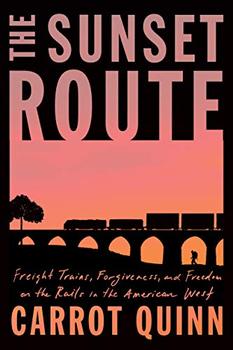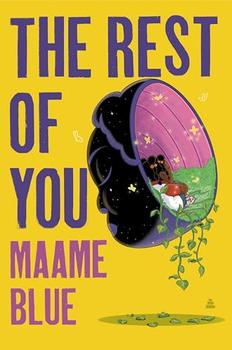Write your own review!
Anne M. (Madison, WI)
Sometimes I feel like a motherless child
The beautiful writing style captured the intense and often difficult realization of being a motherless child. Though Carrot's mother was there, she wasn't. What I found most profound was that she more than survived, and went on to fully understand and make peace with why her mother couldn't be her mother. At times the book was weighed down with mentions of flirtations and revolving short relationships that while important to her life story and her evolution, did little to captivate the reader due to the brevity of their presence in the book. But overall it was a beautiful coming of age story of a girl who had every reason to fall, but didn't. She will be okay. Happy and proud for Carrot!
Marganna K. (Edmonds, WA)
Title & Cover Art Grabbed Me
I'm not a fan of memoirs as a generality; however the book's title, sub-title & beautiful art work on jacket encouraged me to request this book. As I started reading the book I became intrigued - then the summer house guests arrived & I set it aside. This isn't a book to read piece meal; it deserves better than that. House guests cleared out - book back in hand I read it in two days. It's a very readable book.
I liked the writing style of alternating childhood vs current times. The way she weaved her early abusive years with the more adventurous times made the story more bearable. Jennifer's (Jenni, AKA Carrot) neglect, abuse, abandonment...& much more were disturbing to put it mildly. I cannot imagine how children survive the situations the author describes much less become functioning adults.
And yes, I believe Carrot did find her way through this maze of trauma. Although I don't think she has totally cleared out her ghosts she's made an enjoyable life for herself & became a published author.
I liked the descriptive writing - I have a glimmer of knowledge on several aspects of life I had no info on - rail riding, dumpster diving, abandonment, mental-illness, sleeping under a tarp in the rain, falling through the cracks of social services & the good nature/support of many people who help her find her way to overcome her extreme horrible upbringing.
My disappointment with the book is I never felt fully engaged with the author. I got a sense of her loneliness, isolation, grief, abuse, property...vulnerability, courage, resilience, but I was never drawn into the book emotionally.
I would recommend this book to others.
Laurie W. (Sunnyvale, CA)
Roaming the country to find herself
In part, this book is a glimpse into a different way of life that's totally unfamiliar to me. I had no idea that in the 21st century people were still hopping on freight trains to catch a free ride. I can't imagine doing this – it seems scary and uncomfortable – but it's fascinating to hear from someone whose main means of transportation have been freight trains and hitchhiking. We learn more about Carrot's lifestyle – wandering the country, making friends, living with roommates that become communities, making connections while holding tightly to her independence.
Underlying all of this is the story of a girl who grew up with a completely absent father and a mother who lives with mental illness. As the grown-up Carrot roams, she reflects on her past and searches to find her place in the world. Toward the end of the book, we feel that she may just be beginning to discover who she is and where she belongs. Recommended for those who like memoirs of struggle and self-reflection, particularly fans of Cheryl Strayed.
Barbara C. (Riverside, CA)
Memoirs
I am not a fan in general. But Carrot seems to remember her life in a colorful way. Many of us suffered similar lives, but did not shoplift or hop on trains. I appreciate her ability to escape part of her problems. But like all of us we don't escape scott-free. Hope she continues to lead a life she can tolerate.
Roberta R. (West Bloomfield, MI)
Unbelievable Story
The first thing I noticed about the book was the unusual first name of the author ('Carrot") to find out later in the book it was a "handle" adopted by the author at registration for a demonstration (and apparently legally later formally adopted). The next thing I noticed before I even started reading the book was the cover art on the dust jacket, a lone hiker with backpack silhouetted under a train trestle, very lonesome in appearance, the cover art clearly reflective of the book's content.
The Sunset Route is a "memoir" but almost sounds like a fiction or fantasy book. Great Writing, draws you in from the beginning. That one woman could have such an adventuresome life, and yet so sad of an upbringing and life. Maybe dragged a bit at the end.
Shannon L. (Portland, OR)
Interesting story
The Sunset Route is the memoir of Carrot Quinn and her years as a homeless, poor, white vagabond, a life that continues to define her. Carrot Quinn started life with her mother, Barbara, who struggled with untreated mental illness and a younger brother, Jordon. They lived in extreme poverty—with both children wanting for food, heat, stability, and love. Quinn's story comes in nonlinear flashes and can be tough to follow until you begin to recognize her style. Quinn's life is tumultuous. In some places these memories and experiences are hard to read. Mostly, it is the simple story of someone who doesn't give up.
Readers quickly understand that normality is life with a schizophrenic mother who believes herself to be the reincarnation of the Virgin Mary and an absentee father who has given up all parental rights. Quinn and her younger brother are victims of abuse, starvation and, then, homelessness. The Sunset Route opens with an older Quinn who is about to take us on our first freight train ride. By the time we leave Quinn, we will have learned more about riding trains free of charge and finding places to sleep and get food than we hope we will ever need to know. Quinn's life is never stationary. To survive, she adopts bits and pieces of other persons' identities, persons she meets along the way, whom she admires for their passions or their skills at survival. The Sunset Route is filled with vibrant snapshots of people, hitchhiking and, eventually, Quinn's true love, thru-hiking. (Unlike backpacking, thru-hiking is hiking an established trail from one end to the other.)
After a few years of struggle to keep her and her brother sheltered and in school, Quinn's grandparents finally take her in but they are not what she had imagined. They turn out to be very cold and abusive. They feed and clothe her but she is still denied the love she craves. Her saviors are her friends and strangers. Each friend she meets, in the various school systems she attends and on the road, give her the love and friendship severely lacking in her genetic family. Complete strangers offer her meals, rides and places to stay.
Quinn's lifestyle of jumping trains, hitchhiking, living place to place and dumpster-diving is not one I could recommend regardless of how abusive a child's home was, but it was the only way out she saw. By book's end she does find some, but not all, of her answers by living the best life she can on her own terms. I was constantly amazed by the fortitude if this young woman who has the strength to constantly start over again. Quinn writes with honesty, vulnerability and puts it all out there, no holds barred.
The Sunset Route was certainly interesting but a number of elements didn't work for me. The nonlinear structure blends time together, days, weeks and months pass without much remark. It is strongest in the middle. A lot of the chapters were pretty repetitive and it often felt like I was reading the same train-hopping story over and over. I never really cared about about Quinn or how she ends up. The book ends without a strong sense of closure. Simply, there was a lot of potential to the memoir but it never quite developed.
One big missed opportunity in The Sunset Route's is that it nearly begins and ends in Alaska but Quinn doesn't take advantage of the concept. The image of Alaska would have been a great bookend and theme to give the narrative greater significance. At the end Quinn is an adult looking for her mother. She has been away for two decades away and this concept that her travels were spent looking for something only to begin and end in the same place, Alaska, is important and universal.
The Sunset Route is a personal read about hard topics and is a story here worth telling. It has adventure and drama. Quinn never loses her ability to see the beauty in her surroundings and we see this through her writing. A last few pages show the potential for introspection and closure. Maybe she is already working on The Sunset Route, Part 2.
Molly M. (Anchorage, AK)
Well-written and compelling, but sad
This memoir – told in chapters going back and forth between the author's early years in Alaska in an abusive household and later years as a nomadic, train-hopping punk anarchist in Oregon and elsewhere – is well-written and compelling. But readers be forewarned – it's dark and sad. There's not much light here except for the clear, bright Alaska snow and cold and the warmth of a desert wind, and the brief and usually transient friendships. The Alaska descriptions (though there are some inaccuracies) ring mostly true. The family dysfunction and homelessness – largely driven by mental illness and poverty – also ring true. I would have liked more emphasis on what has enabled the author to transcend her background and ultimately set her free.
Tracey S. (Largo, FL)
Enjoyable book
I enjoyed this book! Carrot was a brave girl who grew up before she had to. The parts about her childhood broke my heart. Because her mom had mental health issues Carrot and her brother weren't taken care of the way they should have been. Their clothes were dirty and they went hungry. The way she traveled by train were interesting. She connected with the natural world and learned to live without many things that we take for granted. It was sad reading about how her grandparents treated her and her brother when they were living with them. I think this would be a great book club discussion book.




